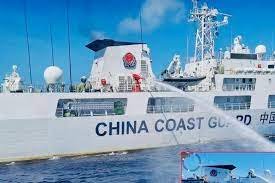
A fresh round of tension has erupted in the South China Sea as the Philippines accuses China’s coast guard of aggressive actions against a Philippine military supply boat. The incident, which occurred near the Second Thomas Shoal, has raised international concerns over maritime disputes in the contested region.
According to the Armed Forces of the Philippines, a Chinese coast guard vessel on Saturday blocked and water-cannoned a chartered Philippine boat on a routine troop rotation and resupply mission. The Philippine authorities have condemned these actions, describing them as “excessive and offensive” against its vessels and in violation of international law.
The Second Thomas Shoal, known as Ayungin Shoal by Manila, is a submerged reef where a small number of Philippine troops live on a rusty World War Two-era U.S. ship that was intentionally grounded in 1999. The Chinese coast guard’s interference disrupted the supply mission, preventing a second boat from unloading essential supplies.
In response to the Philippine’s accusations, China’s coast guard spokesperson, Gan Yu, asserted China’s “indisputable” sovereignty over the Spratly Islands and their adjacent waters, including the Second Thomas Shoal. The Chinese authorities called on the Philippine side to halt what they deemed as “infringing activities” in the area.
The South China Sea is a highly disputed region, with China claiming sovereignty over almost the entire area—a claim rejected by the international community. The Philippines, along with other countries such as Malaysia, Vietnam, Brunei, Taiwan, and Malaysia, also have overlapping claims in certain parts of the sea.
Beijing’s maritime actions and long-term activities, such as building islands on reefs and equipping them with missiles and runways, have often been a source of contention with its neighboring countries, who perceive them as aggressive moves.
The Permanent Court of Arbitration in The Hague ruled in 2016 that Beijing’s expansive claim to the South China Sea had no basis. However, China has consistently refused to accept the ruling and maintains that it does not recognize any claims or actions based on it.
Following the incident, the US State Department expressed concern over China’s “repeated threats to the status quo” in the South China Sea, stating that such actions directly threatened regional peace and stability. The US reaffirmed its commitment to its Philippine allies, emphasizing that any armed attack on Philippine public vessels, aircraft, or armed forces in the South China Sea would invoke mutual defense commitments under the 1951 US-Philippines Mutual Defense Treaty.
As tensions continue to simmer in the South China Sea, the international community remains watchful of developments in the region, hoping for peaceful resolutions to the ongoing maritime disputes.
Sources By Agencies

